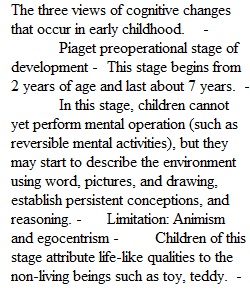


Q 1. Read/study Chapter Nine of the textbook Children: Cognitive Development in Early Childhood. 2. Chapter Assignment: Create Two-Column notes for Chapter Nine. Make sure to explain each section and item in your own words. Where appropriate add an example. If you need to use the textbook's words, they must be have "quotation marks" before and after each phrase you use. 3. OR in your own words, define the Key Terms found at the end of your chapter. In either case, please carefully label your work so that your instructor knows which style of assignment you chose. 4. Your professor prefers that you put all definitions in your own words--it allows her to see that you understand the meanings of the terms and definitions. Where appropriate add an example. If you need to use the textbook's words, they must be have "quotation marks" before and after each phrase you use.
View Related Questions